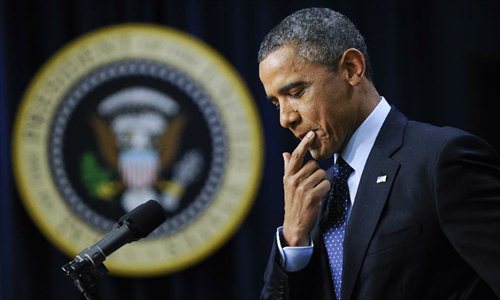Fiscal cliff deal improves prospects for China exports

The legislation passed by the US to avoid the "fiscal cliff" will benefit the Chinese economy in terms of boosting exports and reducing the devaluation risks of China's US debt holdings, but will bring imported inflationary pressure to China, experts said Thursday.
US President Barack Obama signed the "fiscal cliff" legislation into law Wednesday in Hawaii, after the Republican-led House of Representatives approved the legislation Tuesday night.
The law aims to raise taxes on the wealthiest 2 percent of Americans and prevent a tax increase for most American households, but delays automatic spending cuts for two months.
The passage of the legislation boosted the performance of stock markets globally. Hong Kong's Hang Seng Index closed up 2.9 percent to 23,312 points Wednesday, a 19-month high since June 2011, and further up 0.4 percent after Thursday trading.
"Investors' worries that the 'fiscal cliff' crisis could send the world's largest economy back into a recession have been eased, but the positive market sentiment might not continue for long as the law has not solved the US deficit problem," He Weiwen, co-director of the China-US-EU Study Center under the China Association of International Trade, told the Global Times Thursday.
The result was in line with the expectations of He and other Chinese scholars, who believed Republicans and Democrats would compromise at the last minute.
"Allowing the US to fall into the 'fiscal cliff' would have sent the economy back into recession, which was not in accordance with the two parties' interests," Tan Yaling, president of the China Forex Investment Research Institute, told the Global Times Thursday.
Top Chinese officials have highlighted the impact of global uncertainties, especially the US "fiscal cliff" and the eurozone debt crisis, in terms of the effects on China's economy.
If the US falls off the "fiscal cliff," it could drag down China's GDP growth by 1.2 percentage points in 2013, Chinese Vice Finance Minister Zhu Guangyao said at a forum held in December, citing a projection from the International Monetary Fund (IMF).
He Weiwen said the "fiscal cliff" deal is generally positive for Chinese economic growth.
"China's exports to the US will slightly increase in 2013, as the US economy is on track to recover and might realize a 2 percent growth year-on-year in 2013," he said. The US has overtaken the European Union to become China's largest export destination in 2012.
A healthy US economy could also ensure the safety of China's foreign exchange reserves, which are mainly invested in US dollar-denominated assets such as US Treasury bonds, Zhou Jingtong, a senior analyst at the Bank of China, told the Global Times Thursday.
Zhou also warned of negative side effects brought about by the "fiscal cliff" deal.
"As pressure from the 'fiscal cliff' eases, the US is likely to continue its quantitative easing policies this year, which would boost global commodity prices and bring imported inflationary pressure to China," Zhou said.
Officials from the IMF and the EU also expressed cautious optimism on the US "fiscal cliff" deal.
"We welcome the action by the US Congress to avoid sudden tax increases and spending cuts. However, more remains to be done to put US public finances back on a sustainable path without harming the still fragile recovery," Gerry Rice, a spokesman for the IMF, said in a statement Wednesday.
Olli Rehn, EU Economic and Monetary Affairs Commissioner, told the Finnish-language daily newspaper Helsinki News Wednesday that the deal was good news for the EU, but stressed that it was only a "defensive victory" as there were no further solutions on balancing the US federal government's public finances and its continuously increasing debt.